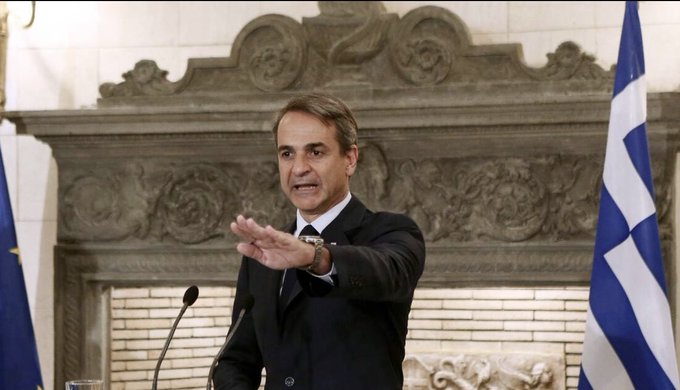In a moment where Mitsotakis regime in Greece blatantly fails to respond to all the big challenges, and particularly the COVID-19 pandemic - which is out of control with the national health system now beyond its limits - the rise of prices and the terrible shape of the Greek economy in general (National Debt exceeds now 200% of GDP), the regime decided to pass another authoritarian law.
As we wrote in May, any big scandals, or cases of extreme police violence are coming on surface thanks to the social media and the independent press affiliated to the opposition. That's because the big media of the Greek oligarchy support the regime tooth and nail through an unprecedented propaganda, while the regime also controls the national public broadcaster (ERT) as it has put its own people in key positions.
As they regime increasingly fails to deal with the big problems (and refuses to reinforce the national health system in the peak of the pandemic), it becomes more and more authoritarian so that to cover its ineffectiveness and to drown any voice of criticism against it.
As the International Press Institute reported:
The undersigned partners of the Media
Freedom Rapid Response (MFRR) today urge the Greek government to
withdraw proposed amendments which would introduce fines and jail
sentences for journalists found guilty of publishing “false news”. We
believe the draft law’s vague definition and punitive sanctions would
undermine the freedom of the press and have a chilling effect at a time
when independent journalism is already under pressure in Greece. The proposed amendments to Article 191 of the Criminal Code, brought forward by the Ministry of Justice, would include penalties for those found guilty of disseminating “false news that is capable of causing concern or fear to the public or undermining public confidence in the national economy, the country’s defense capacity or public health”. It adds: “If the transaction was performed repeatedly through the press or online, the perpetrator is punished with imprisonment of at least six months and a fine”. The publisher or owner of a media outlet responsible would also face prison and financial penalties. Our
organisations understand the serious threat that misinformation poses
to Greek society and other states around the world. Globally, online
falsehoods and conspiracy theories are distorting reality, undermining
democracy and jeopardising the fight against the Covid-19 pandemic.
Social media companies, individual citizens and governments themselves
all have a role to play in countering the spread of harmful
misinformation online. However, the passing of heavy-handed legislation by governments which grants regulators or prosecutors the power to decide true from false and levy punitive fines on the press is not the correct response and would result in more harm than good. As we have seen around the globe, subjective interpretation of such vaguely worded laws can open the door to censorship of legitimate reporting. Media in Greece already face threats from abusive litigation and jail sentences for criminal defamation. Strengthening Article 191 would only create an additional avenue for journalists to face prosecution and jail time. Even when not applied directly, the potential for self-censorship under such legislation is enormous. Like
other similar legislative proposals around the world, the amendment
contains no clear definition of “false news”. The term is ambiguously
defined, broadly applicable and open to misuse. Particularly problematic
is the sanctioning of reports “capable of causing concern” or which
“undermines public confidence” in state authorities. Journalism which
holds power to account naturally shakes the public’s trust in
government, just as investigative reporting causes legitimate public
concern or anger. Under such a vaguely worded law, this kind of vital
watchdog journalism could be targeted by political leaders intent on
limiting criticism of their policies. Journalistic unions in Greece have
rightly criticised the amendment, warning it could lead to journalists
being jailed or fined for reporting on issues such as the pandemic. Rather than improving the existing Article 191 of the Criminal Code, which is already problematic, the government of Prime Minister Kyriakos Mitsotakis would take a major step backwards if this law were eventually passed and send a worrying signal about the administration’s commitment to media freedom. |

Recall that recently Mitsotakis angrily defended his government's immigration policy in a heated exchange with a journalist who accused him of lying over the alleged turning away of asylum seekers in the Aegean. During a joint press conference with his Dutch counterpart, Mark Rutte, late on Tuesday, Mitsotakis was accused of "narcissistic abuse" with his denials that Greek authorities are refusing asylum seekers entry at its land and sea borders.
What's most unbelievable is that Mitsotakis began his response with the phrase “I understand that in the Netherlands you have a culture of asking direct questions to politicians, which I very much respect.", essentially implying that in Greece such a culture (which is how real journalists should operate), is not permitted!
Incredible footage of the Greek PM shouting at a Dutch journalist, after she said he lied over refugee pushbacks.
— Manos Moschopoulos (@maledictus) November 9, 2021
He's not used to tough questions from the local media. Greece only beats Hungary on press freedom in the EU.
A sad sight for all of us who care about our republic. pic.twitter.com/FPmDDqzHDI
Comments
Post a Comment